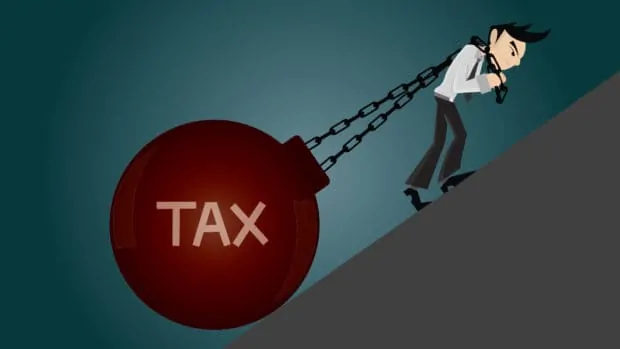Knowing how long you should keep tax records and other financial documents can be confusing. Many people are so afraid to throw away papers that they store boxes of documents for decades. I have to admit that I used to be one of them!
This post will review five tips for keeping the right documents. You’ll learn which financial records you can toss, what to save, and for how long.
Here’s what you should know about tossing records and staying compliant with IRS regulations.
1. Keep digital copies of your filed tax returns
The IRS allows you to keep digital copies of your tax returns and the supporting documents for your income, deductions, and tax credits you claim each year. In general, individuals must keep tax returns and backup for a minimum of three years. That’s because you have up to three years to file an amended tax return or be chosen for a tax audit.
However, you can claim a loss on certain investments for up to seven years. So, if you have complicated transactions, such as the purchase or sale of investments or real estate, it’s wise to keep your tax records for seven years.
While keeping seven years of taxes might sound like a lot, the good news is that digital files are easy to maintain. So, scan your tax returns or ask your accountant for a digital copy instead of adding more paper to your filing cabinet.
If you have a business, the IRS says you typically need to keep business tax records for a minimum of seven years. But they can be digitized, too.
You might use a free scanning app, such as Genius Scan, on your mobile device. It’s loaded with image enhancement features and allows you to export documents as JPEG or multi-page PDF files to email, text, or cloud services such as Google Drive, Dropbox, and Evernote. If you have stacks of paper to scan, a traditional flatbed scanner with a document feeder can be a time-saver. Many inexpensive printers have built-in scanners that send files to your email.
2. Manage your digital files wisely
As you transition from paper to digital tax and financial records, you’ll probably find that you only need a small drawer for your essential files, which we’ll cover in a moment. And if you’re like me, you’ll feel great about decluttering and saving space in your home.
When you begin storing digital files, it’s essential to keep them organized and secure. It’s a good idea to keep them saved in multiple places, so your information could never get lost in a computer crash or a fire. For instance, you might store digital records on your computer, a password-protected external hard drive, and in the cloud.
Consider creating a main folder for each year and subfolders for categories like taxes, investment statements, insurance, paychecks, or other documents you might need in the future. Add a layer of protection by requiring a password to access your main folder. And keep your computer’s operating system and security software up-to-date to ward off cybercriminals.
Once you create a plan for storing your documents, make sure your loved ones know where to find them in an emergency. In my experience, going paperless and organizing your digital files in multiple places makes you feel more in control of your finances.
3. Know which expenses are tax-friendly
I mentioned that you need to keep digital copies of costs claimed as tax deductions or credits on your tax return. Getting familiar with tax-friendly expenses can pay off because they reduce the amount of tax you pay or increase your refund.
A tax deduction is an amount that the IRS allows you to subtract from your taxable income. When you reduce your taxable income, you lower your tax liability. For example, if your taxable income is $50,000 and you’re eligible to claim $10,000 in allowable tax deductions, you only pay tax on $40,000—not $50,000. That makes a huge difference!
A tax credit is a dollar-for-dollar reduction in the amount of tax you owe, which can be more valuable than a deduction. For example, if you owe $1,000 in taxes, getting a $600 tax credit means you save the full amount and only owe $400. Allowable credits, such as the earned income tax credit, are often available for low- to moderate-income workers and those with qualifying children.
Here are some of the most common and valuable tax-deductible expenses you may be eligible to claim:
- State and local taxes, including real estate taxes, up to $10,000.
- Home mortgage interest paid on up to $750,000 of debt to buy, build, or improve a primary or secondary residence.
- Home mortgage points and private mortgage insurance premiums (up to certain limits).
- Qualifying healthcare expenses that exceed 7.5% of your adjusted gross income.
- HSA contributions up to $3,650 for an individual and $7,300 for family coverage when you have a high-deductible health plan.
- Traditional IRA contributions up to $6,000 or $7,000 if you’re over age 50.
- Student loan interest up to $2,500 (if you meet income limits).
- Self-employment expenses, such as one-half of the self-employment tax, retirement plan contributions, and health insurance premiums.
While being self-employed means you typically pay more taxes than an employee, you’re also eligible to claim more deductions. So, always keep supporting documents, such as receipts, invoices, and payments to employees, as digital records. You can take photos and upload them into a bookkeeping program, such as Freshbooks, QuickBooks, or Quicken.
4. Maintain physical copies of vital documents
While going paperless has many advantages, you should keep certain vital paper documents because they’re impossible or very difficult to replace. Hold on to the following original records, even if you have a digital copy:
- Adoption papers
- Birth and death certificates
- Citizenship papers
- Documents with raised seals and notarized signatures
- Education records
- Immunization records
- Marriage and divorce papers
- Medical directives
- Military records
- Passports
- Powers of attorney
- Social security cards
- Wills and trusts
Also, keep essential documents that you may not be able to get online, such as:
- Deeds and titles
- Documents related to gifted or inherited property
- Investment statements
- Promissory notes
- Real estate closing documents
- Receipts for capital home improvements (such as renovations, replacing a roof, installing a pool, etc.)
- Records on nondeductible IRA contributions
In general, you should keep records related to real estate until a couple of years after you sell the property. You need them to figure out your depreciation, capital gains (or losses), and make any amended tax returns.
Consider keeping vital original documents in a secure place, such as a bank safe deposit box. You can get a small storage box for less than $100 a year at a local bank or credit union. If you have an attorney or tax accountant, they can also keep certain records for you.
You could store vital paper records in a home safe or filing cabinet that locks and is fire resistant. For added protection, put your essential documents in an airtight plastic bag and keep digital copies if the originals get destroyed.
5. Get advice from a professional
Get advice from a tax, estate, or legal pro if you aren’t sure what individual or business documents you need or how long to keep records. In addition to the documents listed here, you may have other records or contracts to keep for legal or business reasons.
To sum up, if you can get documents online, such as credit card statements, bank statements, and insurance policies, there’s no need to keep them as paper or digital files. But you should keep your deeds, titles, and purchase confirmations for assets like homes, cars, and investments until the tax year after you sell them.
In general, it’s wise to keep your tax returns for at least seven years, especially if you digitize them and they don’t take up any space. However, you need to keep the originals of certain vital records secure in your home or a bank safe deposit box.
This article by Laura Adams was originally published on Quick and Dirty Tips.








